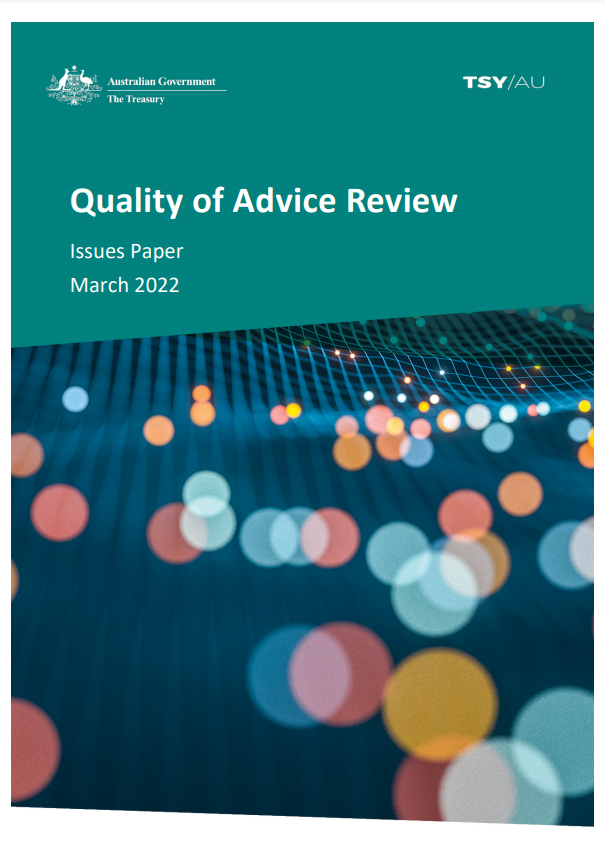The Government has released an issues paper for its 2022 Quality of Advice Review, the purpose of which is to seek industry feedback on the topics raised in the review’s Terms of Reference, the final draft of which was made public earlier this month (see: Quality of Advice Review Terms of Reference Released).
Digital advice
The preamble in the issues paper, released by the Government’s independent reviewer, Michelle Levy, offers several indicators as to what may become key elements in terms of the focus of the review. For example, in what appears to be a nod to the potential future value of digital advice, Levy notes in her foreword that consumers are changing the way they engage with the financial system, where technology improvements “…open up exciting possibilities for delivering advice to consumers in ways that were not feasible in the past.”
Elsewhere, Levy says the sector is beginning to see the introduction of alternative advice providers who are using new technologies and are providing consumers with greater choice around how to access financial advice: “However, digital advice remains a small segment of the market with only one per cent of Australians having used digital advice.”
Unintended consequences of government reforms
…there are concerns [government reforms] …have had the unintended consequence of making financial advice less affordable and accessible
In seeking to determine how Australia’s regulatory framework “…could better enable the provision of high quality, accessible and affordable financial advice,” other key points raised by Levy in her introduction include the need to address the unintended consequences that have stemmed from reforms implemented by the government over the last decade. Levy notes that while these reforms were aimed at protecting consumers by enhancing the quality of financial advice, “…there are concerns that they have had the unintended consequence of making financial advice less affordable and accessible.”
Adviser remuneration – life insurance
Levy also makes reference in her introduction to the review not taking place in a vacuum, but rather being informed by a number of other reviews or projects, including ASIC’s Life Insurance Framework Review, which has, as previously reported, has been rolled into this broader Quality of Advice Review (see: Government Takes Over LIF Review).
The capping of life insurance commissions is referenced elsewhere by Levy where she comments on the decline in adviser numbers in Australia. In noting the fall of adviser numbers on ASIC’s Financial Adviser Register from a peak of 28,561 in June 2019 to 17,492 in February 2022, Levy reflects this decline in adviser numbers could be attributed to a number of factors, including:
- Successive regulatory reforms changing or reducing traditional sources of adviser revenue (where capping life insurance commissions and ending the payment of grandfathered conflicted remuneration are referenced as examples)
- Some advisers bringing forward their authorisations in advance of the professional standards reforms in 2019
- The professional standards reforms creating a higher bar and potential barrier for new entrants, which may have also triggered some advisers that were closer to retirement to transition out of the industry early, rather than complying with new education or exam requirements
Decline in adviser numbers – perspective
Further on the decline in adviser numbers, Levy takes the opportunity in her introduction to make a comparison of the number of advisers in Australia and the United Kingdom, relative to the population of each country.
She notes there are presently around 27,000 registered advisers in the UK, serving a population in the region of 68 million, compared with around 17,500 Australian advisers serving a population nearing 26 million.
The issues paper itself considers the framework for review around quality, affordable and accessible financial advice and the regulatory environment in which that advice is delivered.
Submissions to the Quality of Advice Review can be made to: AdviceReview@treasury.gov.au. Submissions close on 3 June 2022, with the critically important Quality of Advice Review Report due to be submitted to the Government on or by 16 December 2022.
Click here or on the image below to access of the Government’s March 2022 Quality of Advice Review Issues Paper.





Levy sounds like she is a bank lapdog. Fantastic! LNP again choosing to destroy the industry with yet another “expert” who knows nothing about the work advisers actually do.
Comments are closed.